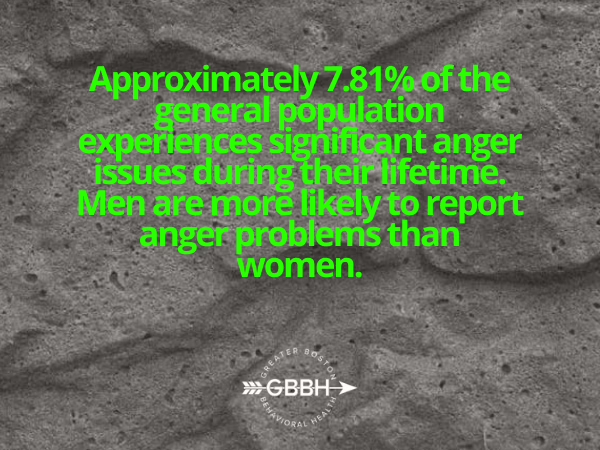Anger is a natural human emotion that can be both constructive and destructive. It serves as a response to perceived threats, injustices, or frustrations. While occasional anger is normal, chronic or uncontrolled anger can negatively impact mental and physical health. Understanding the connection between anger and mental health is crucial for developing effective strategies for emotional regulation.
This blog will explore the connection between anger and mental health, the potential consequences of unchecked anger, and effective strategies for finding balance through professional support.
The Link between Anger and Mental Health
Anger is often a symptom or trigger of underlying mental health conditions, such as anxiety, depression, and post-traumatic stress disorder (PTSD). When anger becomes overwhelming, it can lead to destructive behaviors, strained relationships, and even physical health issues, such as high blood pressure and heart disease.
How Mental Health Conditions Influence Anger:
Depression: Individuals struggling with depression may experience irritability and frustration, which can manifest as anger.
- Anxiety Disorders: Chronic anxiety often leads to heightened emotional responses, making individuals more prone to anger outbursts.
- PTSD: Those with PTSD may react aggressively due to past trauma, even in non-threatening situations.
- Bipolar Disorder: Mood swings associated with bipolar disorder can lead to episodes of extreme irritability and anger.
Understanding these connections helps individuals seek appropriate treatment to manage their emotions effectively.
The Consequences of Unmanaged Anger
Chronic uncontrolled anger can have negative effects on mental, emotional, and physical health, leading to long-term complications.
1. Physical Health Risks
Unmanaged anger triggers the body’s fight-or-flight response, causing increased heart rate, elevated blood pressure, and higher levels of stress hormones. Over time, these responses can contribute to:
- Heart disease
- High blood pressure
- Weakened immune system
- Increased risk of stroke
2. Strained Relationships
Anger can push away loved ones and create tension in relationships. Whether through verbal aggression, passive-aggressiveness, or physical reactions, chronic anger can lead to broken relationships and isolation.
3. Increased Risk of Substance Abuse
Many individuals turn to drugs or alcohol to self-medicate and suppress anger. Anger management in recovery is crucial, as substance use can exacerbate emotional instability, leading to relapse, reckless behavior, or worsening mental health symptoms.
4. Legal and Professional Consequences
Uncontrolled anger can result in workplace conflicts, job loss, or legal trouble due to aggressive behavior. Learning healthy emotional regulation through CBT Therapy and DBT Therapy can prevent impulsive actions that lead to these consequences.
Strategies for Managing Anger and Finding Balance
Managing anger effectively requires self-awareness, emotional regulation, and structured coping strategies. Here are some key techniques for finding balance and regulating emotional responses.
1. Identify Triggers and Patterns
Understanding what triggers anger is the first step toward managing it. Keeping a journal to track situations that lead to irritability, frustration, or outbursts can help identify patterns.
Common Triggers Include:
- Feeling disrespected or ignored
- Experiencing injustice or unfair treatment
- Being overwhelmed by stress or pressure
- Facing past trauma or unresolved emotional wounds
Therapeutic Approach:
In CBT Therapy, individuals learn to reframe negative thought patterns and develop a healthier perspective on anger-inducing situations.
2. Develop Healthy Coping Mechanisms
Finding constructive ways to process emotions can help reduce anger intensity.
Healthy Coping Strategies:
- Deep breathing exercises to slow down physiological responses
- Mindfulness and meditation to stay present and prevent emotional escalation
- Physical activity like jogging or yoga to release built-up tension
- Creative outlets such as journaling, painting, or playing music to express emotions safely
Therapeutic Approach:
DBT Therapy teaches distress tolerance skills, which help individuals accept and manage difficult emotions without impulsive reactions.
3. Learn Emotional Regulation Techniques
Regulating emotions means responding rather than reacting.
Techniques to Improve Emotional Control:
- The 10-Second Rule – Pause and count to ten before reacting to a stressful situation.
- Self-Talk Strategy – Challenge negative thoughts by asking, “Is this reaction necessary?”
- Assertive Communication – Express feelings without aggression, using “I” statements.
Example:
Instead of saying, “You never listen to me!”
Try, “I feel unheard when I talk about my concerns, and I’d appreciate it if we could discuss this calmly.”
Therapeutic Approach:
Anger management programs at Greater Boston Behavioral Health focus on teaching emotional regulation skills, reducing impulsivity, and developing positive communication strategies.
4. Seek Professional Support Through Therapy Programs
If anger is disrupting daily life, professional support is essential.
Mental Health Therapy Programs for Anger Management:
- CBT Therapy – Helps individuals identify and change negative thinking patterns that fuel anger.
- DBT Therapy – Focuses on mindfulness, distress tolerance, and emotional regulation.
- Group Therapy Programs – Provides a supportive environment for discussing and practicing anger management strategies.
- Family Therapy Programs – Helps rebuild relationships by improving communication and conflict resolution.
The Role of Treatment in Anger Management
Being aware of ourselves and skill development are necessary for effective anger control. Cognitive behavioral therapy (CBT) and behavioral therapy (DBT), two researched therapy techniques, have been shown to be effective in assisting people in achieving mental control.
DBT Therapy for Anger Management
DBT therapy is a structured approach that helps individuals regulates intense emotions. It incorporates mindfulness, emotional regulation, distress tolerance, and interpersonal effectiveness. DBT therapy teaches individuals to recognize triggers and respond in a healthy way rather than reacting impulsively.
CBT Therapy for Anger Management
CBT therapy focuses on identifying and changing negative thought patterns that contribute to anger. By restructuring cognitive distortions, individuals can develop healthier responses to stressors. CBT therapy helps individuals recognize anger triggers, develop problem-solving skills, and practice relaxation techniques to prevent aggressive reactions.
Managing Anger during Recovery
Anger control is essential to the healing process for those in recovery from addiction disorders. Anger can be both a cause and an effect of substance use, and addiction frequently results from untreated psychological issues. Joining in an Anger management program while in therapy lowers the chance of return by helping patients in creating healthy ways to cope.
Programs for Anger Management in Mental Health Treatment
Effective anger management requires seeking qualified help through specialized mental health therapies. These programs provide systematic guidance on emotional regulation and personalized treatments that address the roots of anger.
Finding Support in Boston
Behavioral health in Boston area, accessing quality services is crucial. A Mental Health Treatment Center in Boston can provide comprehensive care, including therapy, medication management, and group support, to help individuals regain emotional stability and lead healthier lives.
Why Choose Greater Boston Behavioral Health?
Our Mental Health Treatment Center in Boston offers personalized treatment plans to help individuals manage anger, regulate emotions, and build healthier relationships.
What We Offer:
- Experienced Clinicians – Specialized in CBT Therapy, DBT Therapy, and anger management programs.
- Customized Treatment Plans – Tailored to each individual’s emotional regulation needs.
- Safe & Supportive Environment – A compassionate space for learning, healing, and growth.
Greater Boston Behavioral Health: Your Partner in Mental Wellness
If you or a loved one struggles with anger-related issues, seeking professional help is the best decision you can make. At Greater Boston Behavioral Health, we offer evidence-based treatments, including DBT therapy, CBT therapy, and comprehensive Mental Health Treatment Programs tailored to your needs. Our Mental Health Treatment Center in Boston provides a compassionate and supportive environment to help you regain control over your emotions and improve your overall well-being.
Take the first step towards a balanced life. Contact Greater Boston Behavioral Health today and begin your journey to emotional wellness.
Take Control of Your Anger and Emotional Well-Being
Anger does not have to control your life. With the right support, therapy, and coping strategies, you can transform anger into a tool for self-growth rather than destruction.
If you or a loved one is struggling with anger management, seeking help is a sign of strength, not weakness. Call Greater Boston Behavioral Health today at (888)278-0716 to learn more about our Anger Management Program, DBT Therapy, and Mental Health Treatment Programs. Take the first step toward a healthier, more balanced life today.
FAQ on Anger and Mental Health
How does anger affect mental health?
Anger, when left unmanaged, can contribute to mental health challenges such as anxiety, depression, and emotional dysregulation. Chronic anger may lead to stress-related health issues, strained relationships, and difficulty maintaining emotional stability.
What mental health conditions are linked to anger issues?
Anger is commonly associated with anxiety disorders, depression, PTSD, bipolar disorder, and borderline personality disorder (BPD). Individuals struggling with emotional regulation may find it harder to control anger responses.
How can therapy help with anger management?
Therapies like CBT (Cognitive Behavioral Therapy) and DBT (Dialectical Behavior Therapy) help individuals identify triggers, reframe negative thoughts, and develop healthy coping strategies for emotional regulation.
What are the benefits of an anger management program?
An anger management program provides structured guidance on:
- Identifying anger triggers
- Learning healthy emotional regulation techniques
- Improving communication and conflict resolution skills
- Reducing stress and impulsive reactions
Does Greater Boston Behavioral Health offer anger management support?
Yes, we provide individual therapy, group therapy, DBT therapy, and anger management programs designed to help individuals regain emotional balance.
When should I seek professional help for anger?
If anger negatively impacts your relationships, work, or daily life, or leads to physical aggression, substance abuse, or legal issues, seeking help through a Mental Health Treatment Program can provide the necessary tools for healthier emotional responses.


